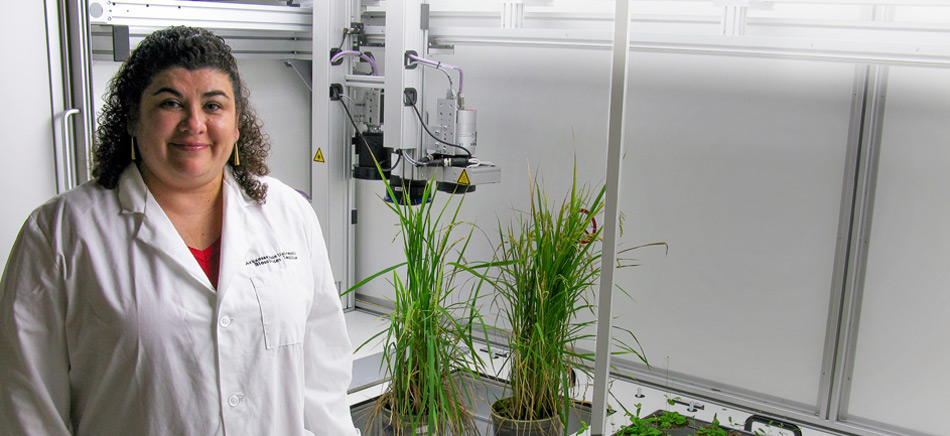Researcher is Leading Crop Phenotyping Study for National Science Foundation-funded Project

JONESBORO – A federally funded research project that will lead to a new system for analyzing factors that inhibit plant growth is getting underway at Arkansas State University.
Dr. Argelia Lorence, associate professor of chemistry and physics, is co-principal investigator for the research, which is part of the ASSET Initiative project of the Arkansas Science and Technology Authority (ASTA).
She will be using a scientific technique called "high-throughput phenotyping" or phenomics, which is the process of using bioimaging technologies to analyze how various stress factors affect plants. This will help identify genetic characteristics that make plants more tolerant to those stresses.
At the Arkansas Biosciences Institute on the A-State campus, Lorence is in charge of the Plant Phenotyping Facility. In plant phenotyping, she uses a National Science Foundation (NSF)-funded platform called Scanalyzer HTS.
This powerful system uses visible, fluorescent and near-infrared cameras and specialized software to measure the size, architecture, in-plant chlorophyll fluorescence and water content of large numbers of plants or plant parts in a non-destructive fashion. This allows multiple measurements to be taken of the same plants during their entire life cycle. This data helps researchers analyze various forms of plant stress, such as drought, salinity, insects and disease.
“A-State’s Scanalyzer HTS was the first instrument of this kind to be owned by a public university in the USA. Before us, only large plant biotech companies had access to this technology,” Lorence explained. “With our partners in Missouri, we will carry out four subprojects that will serve as test beds, in which we will develop new tools and approaches to study plant stress. We also plan to fund seed grants that will allow multiple scientists in Arkansas and Missouri to incorporate the Scanalyzer HTS and other imaging technologies into their research programs."
ASTA announced recently it has been awarded a $3 million NSF grant to conduct the research as part of a larger, multi-state award with Missouri. A-State's portion will be about $1.36 million.
"Students of all levels, from undergrads to post-doctoral researchers, will participate in this process," she continued. "In addition, some of our students will have the opportunity to do summer internships at the companies that are leaders in this field, including LemnaTec, the manufacturer of the Scanalyzer system in Germany, and Pioneer in the U.S.A.”
Over a three-year period, the funds will support creation of a state-of-the-art bioimaging consortium that " . . . will enable researchers to adapt food, fiber and fuel crops to meet the challenges of a changing climate and a growing world population," according to the project summary.
Dr. Gail McClure of ASTA serves as the administrative lead for the project; Lorence and Dr. Fiona Goggin of the University of Arkansas are the scientific leads. The NSF grant for the two states totals $6 million.
"Dr. Lorence has obtained, through previous support from the National Science Foundation, the research experience and unique equipment infrastructure to provide the leadership on this project for plant phenotyping," according to Dr. Andrew Sustich, vice provost for research and graduate studies at Arkansas State. "The project will provide important information on how plants react to environmental stress, including changing climate. This will help ensure Arkansas remains a leading agricultural state, and our students who are trained in her laboratory will be leaders in this vital area."
Ultimately, the research should directly benefit the agriculture-based economies of the two states by generating new tools for reducing crop losses due to stress factors.
# # #





